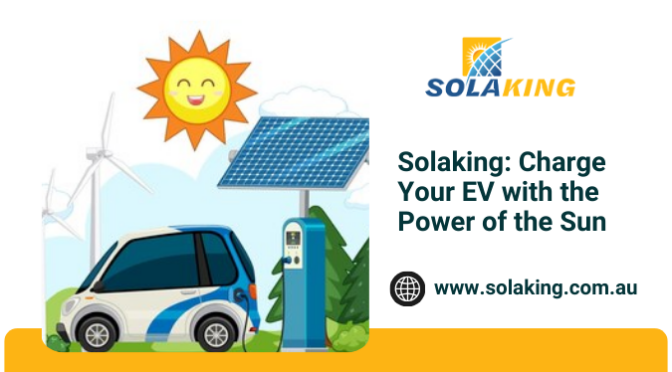With the rise of electric vehicles (EVs) and the increasing emphasis on sustainable energy, many people are exploring ways to charge their EVs using solar power systems. This approach not only reduces reliance on the grid but also cuts down on greenhouse gas emissions. In this blog, you’ll get an in-depth look at how you can charge your EV with solar power.
Understanding The Basics of Solar EV Charging
Solar panels efficiently convert sunlight into electricity. These panels can be easily installed on the roof of your home or a dedicated carport. Once installed, the electricity generated by the solar panels can be used to power both your home and your car. Moreover, any excess energy can either be stored in a battery system or fed back into the grid, ensuring that no energy goes to waste.
To charge an EV with solar power, you will need an EV charger. Fortunately, EV chargers come in different levels, with Level 2 chargers being the most common in Australia for home use. These chargers, in particular, provide a faster charging rate compared to the standard Level 1 chargers that typically come with most EVs.
Direct Solar Charging vs. Grid-Tied Systems
Before calling in the solar panel installers, have a look at the two types of solar panel setups.
- Direct Solar Charging
Direct solar charging involves using solar panels to generate electricity that is directly fed into your EV’s battery. However, this method can be complex and costly, as it requires, in addition to a large number of solar panels, sophisticated equipment to manage the direct current (DC) power from the panels. Furthermore, the system needs to be carefully designed to ensure efficiency. As a result, it may not be the most practical solution for everyone. Nevertheless, it offers a sustainable way to charge an EV using clean energy..
- Grid-Tied Systems
In this setup, your solar panels generate electricity, which is first used to power your home and then your car. Any excess electricity is sent to the grid, and you can draw power from the grid when your solar panels aren’t producing enough energy, such as at night or on cloudy days. This system is simpler and more cost-effective, leveraging net metering to balance your energy usage and production.
Benefits of Charging Your EV with Solar Power
There are numerous advantages of using solar power systems for EV charging. Those include:
- Cost Savings
While the initial investment is a bit high, the long-term savings on electricity costs is substantial. Solar power can drastically reduce your electricity bills, particularly if you live in a sunny region.
- Environmental Impact
Using solar power to charge your EV significantly reduces your carbon footprint. By switching to solar energy, you harness a clean, renewable resource, contributing to a reduction in air pollution and helping combat climate change.
- Energy Independence
Solar power systems provide a high level of energy independence, reducing your reliance on the grid and protecting you from fluctuations in electricity prices.
Considerations for Solar EV Charging
- System Size and Energy Needs
To effectively charge your EV with solar power, you need to ensure your solar system is appropriately sized. This involves calculating your daily energy consumption, including your household needs and the energy required to charge your EV.
- Storage Solutions
Incorporating a battery storage system can enhance the efficiency of your solar setup. Batteries store excess solar energy generated during the day for use at night or during cloudy periods. This setup maximises your use of solar power and minimises reliance on the grid.
Consulting with a solar energy expert like Solaking can help you design a system that meets your specific needs. Call 0413813893 today and set foot on the path to a greener tomorrow.




